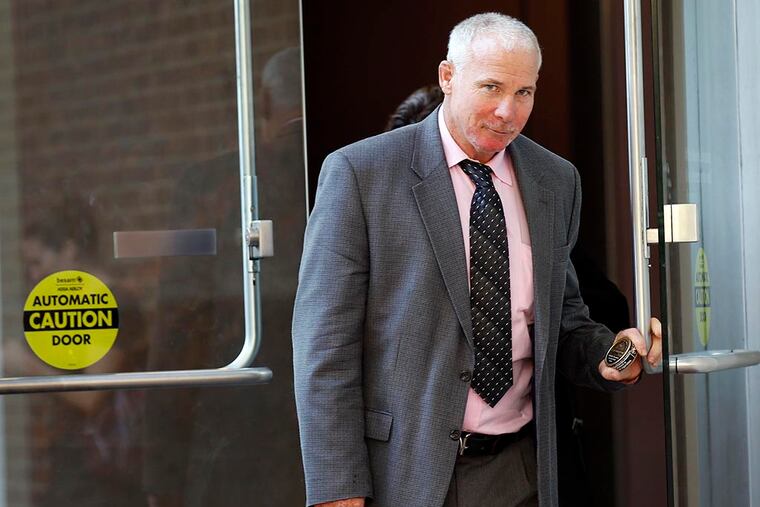Ironworkers 'hit man' sentenced to more than 6 years
James Walsh pleaded guilty to the 2012 Quaker meetinghouse arson and other incidents.

JAMES WALSH, known as the "hit man" of Ironworkers Local 401, who used an acetylene torch to cut through a Quaker meetinghouse under construction and to damage a Grays Avenue warehouse, was sentenced yesterday to six years and three months in prison.
A different picture from the rough, ready-to-fight, blustery union guy portrayed in court documents emerged at Walsh's sentencing hearing.
A dozen friends and family members told U.S. District Judge Michael Baylson that Walsh, 50, was a hard worker who kept the interests of his family in mind and who would be the person they would call in times of need.
Assistant U.S. Attorney Robert Livermore praised Walsh's cooperation with the feds, saying the information he provided "was especially significant." He also noted how difficult it must have been for Walsh to testify at the January trial of his former boss, Joseph Dougherty, in a courtroom full of union Ironworkers who were hostile to Walsh.
Walsh's attorney, William J. Brennan, told the judge that his client is "a lot more than the guy who coined the acronym T.H.U.G." - which, the government has noted, stood for "The Helpful Union Guys."
Brennan said what Walsh did was wrong, but also noted the crimes committed - known as "night work" - "was the culture of the Ironworkers at the time."
"He couldn't get day work unless he did 'night work,' " Brennan said.
In December 2012, Walsh used the torch to cut the metal infrastructure and anchor bolts of the new Quaker meetinghouse under construction in Chestnut Hill. Another union member, William Gillin, set a crane on fire.
Carolyn Schodt, of the Chestnut Hill Friends Meeting, told the judge yesterday the group's losses were "relatively minor," but the crane owner "may have suffered more substantial and lasting damages." She said the Quakers "generally oppose lengthy prison sentences for punitive purposes alone, since we believe that all lives are redeemable."
Walsh also used the acetylene torch to damage a warehouse on Grays Avenue in Southwest Philly in July 2013. And he was a conspirator in an October 2013 attempted arson in Malvern.
He pleaded guilty to racketeering conspiracy and five arson-related counts in September.
Walsh yesterday told the judge: "The crimes I've committed, I'm very deeply sorry for."
Baylson said the destruction caused by union Ironworkers on construction sites "was an epidemic of violence" that caused "many law-abiding people in Philadelphia to throw up their hands." Initially, "nobody knew who was doing it," the judge said.
He said the reason for such violence - because union ironworkers were not getting jobs - "shows a warped mind, a criminal mind" and is "incomprehensible in a civil society."
Walsh was ordered to begin his prison sentence May 4, and was ordered to pay $128,000 in restitution, with co-defendants.
Dougherty, 73, the lone defendant who went to trial and who was convicted, is in custody awaiting sentencing.